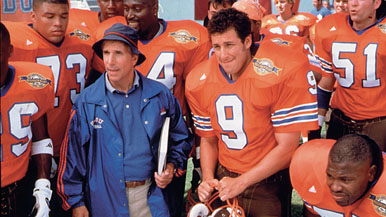Hollywood Psych
By Sean Collier
June 15, 2009
The Hangover is now riding a two-weekend run at the top of the summer box office. This is no small feat for any number of reasons, chief among them fending off two big-time summer competitors in Up and The Taking of Pelham 123, as well as utterly demolishing Will Ferrell's complete misfire, Land of the Lost. Most interesting, however, is The Hangover's success without any marquee names to build around.
In the 1990s and through most of this decade, comedy was the realm of a pack of megastar funnymen. Before the turn of the century, it was the likes of Mike Myers, Jim Carrey, and Adam Sandler; in the 2000s, we had Ferrell, Vince Vaughn and Jack Black. These stars, both then and now, preceded the subject matter of the film in terms of marketing impact. Think of a film like The Waterboy – you wouldn't describe it as "A comedy about a backwards bayou football player," you would describe it as "That Adam Sandler football movie. Not The Longest Yard, the one that was kinda funny." More recently, Will Ferrell has trusted that all he has to do is change costumes to sell tickets, especially with his yawn-inducing sports run (Talladega Nights, Blades of Glory, Semi-Pro.)
The idea was that we trusted these actors to be funny, and weren't much concerned with what the film was about; we had a good inkling of what the movie would feel like and what we were getting for our money. Studios saw this, and rode basically every bankable comedy star to a half-dozen projects – the model perhaps best demonstrated by Jim Carrey's early career, as Ace Ventura flowed into The Mask, Dumb and Dumber, The Cable Guy, Liar Liar, on and on until The Truman Show broke the streak.
Currently, we should be in the period of time when one group of manchild actors phases out and the next phases in; around the turn of the last decade, Ben Stiller and Owen Wilson bridged the gap between '90s comedy and 2000s comedy quite naturally. Instead, however, comedy seems to be shedding the need for bankable stars.
2007 was the great kick-off of this trend, as the two top-grossing comedies for grown-ups were Knocked Up ($148.7 million) and Superbad ($121.4 million.) Knocked Up marketed itself around Seth Rogen, then an almost complete non-entity, and Superbad appealed to the minor followings that Jonah Hill and Michael Cera had amassed, but mainly rode a wave of good advertising to success. Both films out-grossed such star-driven comedies as Adam Sandler's I Now Pronounce You Chuck and Larry, Ferrell's Blades of Glory, Steve Carell's Evan Almighty, and Eddie Murphy's Norbit. Rogen and Hill proved more bankable than the last 20 years of comedy superstars.
Meanwhile, those stars continue to search for hits. Mike Myers utterly destroyed his career with the heavily marketed, $32 million-grossing bomb The Love Guru. Jim Carrey's highly touted return to comedic form, Yes Man, couldn't scrape together $100 million over the 2008 holiday season, while Adam Sandler's Bedtime Stories struggled as well. Will Ferrell has put up two certifiable bombs in Semi-Pro and, now, Land of the Lost. And the less said about Eddie Murphy, the better.
Continued:
1
2
|
|
|
|




